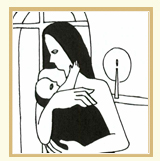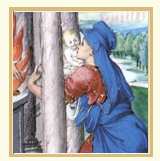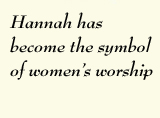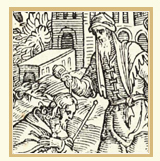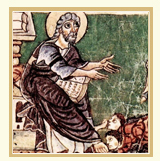From Prayer to Prophecy
Returning to Hannah’s song of exultation we note the evolution from the first-person singular, where Hannah expresses her personal story and appreciation to a broader, all-encompassing appreciation of the wonders of God. Hannah does not refer exclusively to her reversal of fortune,—from barren to fruitful—she expands the scope to include the hungry that are sated, the poor who become rich and the vanquished who reign victorious. As arbiter of life and death, God’s cosmic power is mobilized for the socially marginal. Barrenness is simply one expression of the despair and oppression that only God can eliminate.
Talk no more with lofty pride,
Let no arrogance cross your lips!
For the Lord is an all-knowing God;
By Him actions are measured.
The bows of the mighty are broken,
And the faltering are girded with strength
Men once sated must hire out for bread;
Men once hungry hunger no more.
While the barren woman bears seven,
The mother of many is forlorn.
The Lord deals death and gives life,
Casts down into Sheol and raises up.
The Lord makes poor and makes rich;
He casts down, He also lifts high.
He raises the poor from the dust
Lifts up the needy from the dunghill,
Setting them with nobles,
Granting them seats of honor.
For the pillars of the earth are the Lords
He has set the world upon them.
He guards the steps of His faithful,
But the wicked perish in darkness—
For not by strength shall man prevail.
The foes of the Lord shall be shattered;
He will thunder against them in the heavens.
The Lord will judge the ends of the earth.
The appropriateness of Hannah’s testimonial to the Master of the Universe can well be understood against the backdrop of her long years of childlessness. The message of Hannah’s song was so powerful that it was integrated into the scriptural readings of Rosh Hashannah. Her story and song are read as the haftarah of the first day of Awe. Hannah champions the cause of people whose hopes have ebbed, and reassures them that God is capable of reversing their fortunes. Hers is a powerful testimony to the efficacy of petitionary prayer and a striking example of exultant praise of the God who inscribes us in the Book of Life.
In most Sefardi and Eastern communities the custom of reciting Hannah’s thanksgiving prayer is not limited to Rosh Hashannah. It is actually recited daily at the beginning of the morning service.
R. Shem Tov Gagin, one of the leaders of the Sefardi community of England writes:
I am not aware who instructed to say this prayer of Hannah before the other prayers, and only the Sefardim that are in Eretz Israel and Spain, Tunisia and Morocco have this custom and not the Sefardim in London and Amsterdam and not the Ashkenazim. They also don’t say the rest of the collection of verses. Perhaps it was initiated by kabbalists from the time of the Ari, may his memory be blessed.
(Shem Tov Gagin, Keter Shem Tov, Part 1, quoted in: Yaakov Glis, The Customs of Eretz Israel, Jerusalem, 1994, pp. 21-22)
The origin of this custom is not clear, but it is quite widespread. It is common among the Syrian, Moroccan, Judeo-Spanish and Bucharan Jews as well as the Sefardim of Eretz Israel. It is not recited amongst the London Spanish and the Spanish-Portuguese or any of the Ashkenazi communities.
[A current authority, R. Benzion Mutzafi, writes in response to a question regarding this custom:
But, at any rate, it could be that it is a correct custom, and it is followed in some countries and not in others and like a river, it spread. And see what the Gaon Rabbi Yaakov Rokeach wrote in his book “Shaarei Tefillah” (page 4b), recommending the custom of reciting “Vatitpalel Hannah” before the morning prayers and he wrote there, in the name of the Rabbi of Avodat HaTamid, that one who recites it abolishes the forces that try to prevent the prayers, just as Hannah ended in her prayer, “They that strive with the Lord shall be broken to pieces” …and in recent generations it has been printed in siddurim, and in our time it has spread by the printers and appears in most of the siddurim and like a river it spread.
(Benzion Mutzafi, Responsa Mevasseret Tzion, Part 1, Jerusalem, 2005, pp. 19-20)
Understandably, Hannah’s prayer became relevant to pray-ers world-wide. However, her song ends on a curious note:
He will give power to His king,
And triumph to His anointed one.
How odd—her son Samuel is not destined to become king. What does Hannah have in mind? Even if God will bring salvation through the kings of Israel that Samuel is destined to anoint, what relevance does that have for Hannah’s personal transformation into motherhood and her elation at having a son? David Silber offers the following explanation:
The passage which immediately follows Hanna’s song (Now Eli’s sons were scoundrels; they paid no heed to the Lord (1 Sam 2:12ff.)) informs us of the corrupt practices of Shilo in general and of Eli’s children in particular (benei belial). In retrospect, the sons of Eli seem to be the evil men of whom Hanna spoke. In chapter 1, we discover, Hanna was not praying only for a child; she was praying for a leader who would establish a new order in Israel. It is for that reason that Elkana cannot console his wife. Hanna does not respond to the rhetorical question, “Am I not better than ten sons?” Elkana only understands Hanna’s grief on a personal level. But Hanna’s grief is two-fold: Hanna wants a son, but Hanna also wants a leader. Hanna will train her son to be a leader.
(David Silber, “Kingship, Samuel and the Story of Hanna”, Tradition 23,2 (1988), pp. 64-75.)
This insight serves to explain the inexplicable: How was it possible for Hannah to part with her son after so many years of anticipation? The answer can be found in the persona of Hannah the prophetess. Hannah possessed long-range vision. She was well aware of the moral corruption that existed in the religious establishment. Hannah vowed that her child would fill the void and provide the requisite leadership to inaugurate a new era. In the very same way that Hannah, the prophetess, had judged the situation and made a conscious decision to enable this paradigm shift, her son Samuel would become a judge, a prophet and an enabler of the entire Israelite monarchy. Hannah’s contribution to the people of Israel in her own day was invaluable, but her faith, leadership and prayer continue to be a remarkable source of inspiration for all time.
